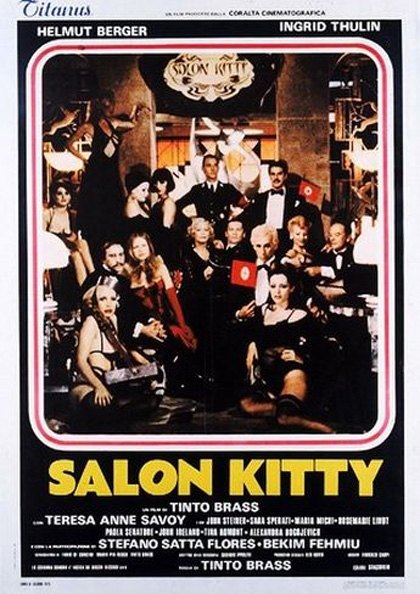In Salon Kitty sex is an inextricable web of attraction and repulsion, as well as one huge metaphor for power. The film’s eroticism has two distinct faces: on one hand, it sinks us into a dark cavern of baseness and psychopathology; on the other hand, it raises us up to unpredictable territories of sensuality and yearning. In both cases, the conclusion it reaches is as disturbing as it is clear: power is monstrous. A concept that Tinto Brass will once again tenaciously reaffirm in his next film, Caligola. In addition to encouraging obvious references to Luchino Visconti’s Caduta degli dei (and not only in the casting of Helmut Berger and Ingrid Thulin), the rich imagery of Salon Kitty is nourished by splinters of expressionism, hints of decadentism and fantastical strokes of Freud and Nietzsche. Tinto Brass may well be a poet of erotic cinema, as long as we don’t consider poetry simply a dainty pastime. The film also gives us the second important cinematic appearance of Teresa Ann Savoy, one of the symbols of sexual liberation in the early 1970s.
Berlin, 1939. The prestigious brothel known as “Salon Kitty”, exclusively frequented by high ranking military officials, is in reality a centre for spying, perfectly constructed to catch anyone who might dare criticise the Nazi regime. Prostitute Margherita is in love with an officer who ends up being caught in the web. She takes revenge by accusing the man responsible for the entire spy ring, SS Lieutenant Wallenberg, of treason.
In Salon Kitty sex is an inextricable web of attraction and repulsion, as well as one huge metaphor for power. The film’s eroticism has two distinct faces: on one hand, it sinks us into a dark cavern of baseness and psychopathology; on the other hand, it raises us up to unpredictable territories of sensuality and yearning. In both cases, the conclusion it reaches is as disturbing as it is clear: power is monstrous. A concept that Tinto Brass will once again tenaciously reaffirm in his next film, Caligola. In addition to encouraging obvious references to Luchino Visconti’s Caduta degli dei (and not only in the casting of Helmut Berger and Ingrid Thulin), the rich imagery of Salon Kitty is nourished by splinters of expressionism, hints of decadentism and fantastical strokes of Freud and Nietzsche. Tinto Brass may well be a poet of erotic cinema, as long as we don’t consider poetry simply a dainty pastime. The film also gives us the second important cinematic appearance of Teresa Ann Savoy, one of the symbols of sexual liberation in the early 1970s.
Berlin, 1939. The prestigious brothel known as “Salon Kitty”, exclusively frequented by high ranking military officials, is in reality a centre for spying, perfectly constructed to catch anyone who might dare criticise the Nazi regime. Prostitute Margherita is in love with an officer who ends up being caught in the web. She takes revenge by accusing the man responsible for the entire spy ring, SS Lieutenant Wallenberg, of treason.


